The "Ancestral Principle" Is Not Good Enough: A response to Imperium Press et. al
Why Pagans cannot claim pre-history, and how their reconstructionist efforts are doomed to fall short.
In my recent sparring bouts with Substack bagans, I’ve hammered on this syllogism:
P1: We have no idea what the European peoples of even 7,500 years ago believed.
P2: Modern paganism is an approximation of a recent presentation that has changed over time.
C: Therefore, both Christians and pagans must answer why they believe in something their ancestors didn’t.
Keep this in mind as I respond to this Imperium Press article:
which attempts to legitimize modern paganism as the heir to the faith of Europeans past. I’m going to go through this article because, while written in good faith, it suffers from a lack of perspective.
You should read my response if you’re a Christian, Pagan, WN, or otherwise interested in how this dialogue plays out in the 21st century.
Lastly, it was recommended by one of my favorite Chudstack pagans
.The article begins with this image:
While the implication is that Christians copy their pagan counterparts by attempting to “appeal to tradition”, this image’s inclusion already puts the article on shaky ground for me. A Christian of any conviction and mental gumption will want you to go to his church. I think there is an interesting argument for how ethnicity informs our church selection process, but I find stuff like this very reductive in that it makes theology an RPG class you select based on where you were born.
There is a genetic answer, I think, for why Europeans of a certain stripe flocked to one church or another, and that answer must be layered on with history and anthropology. The Scandinavians, for example, nominally converted to a Reformed Protestantism because they always loathed the Catholic Church. Something about them has always been very irreligious. The same cannot be said for the German princes who began the Reformation out of sincere ideological commitment before capitalizing on the “momentum” the exodus from Catholicism generated.
The point is, I think Mr. “Frogbutt” is pretty unserious about the whole process of selecting a Church and this ironically underscores the need for actual authority.
Anyway, onto the article itself:
Paganism is seen by Christians, Jews, and others as “choose your own theology”, where you just make it up as you go along.
As a byproduct, yes. He goes on to mention the Marvel-tier offshoots like Wicca, which I am not even going to give a second of our (IP, me, and you, the reader) time because they’re self evidently retarded and wholly indefensible as true spiritual systems. It’s more accurate to say Academic Christianity sees Paganism as a flower with no roots. It’s visually pleasing on the outside, but it’s not connected to anything of substance. I find paganism to be one of the few viable boxing partners for Christianity, and I like it enough to say their critiques about the decrepit and decadent state of Western spirituality are typically quite valid.
That being said, there is very little meat on the bone for 🅱️agans today, and it remains to be seen if there ever was. As I said, the “paganism” of 5000+BC (and I’m being gracious with that number) is lost to us. We have literally zero idea what these people believed. Calling it “paganism” as if it were a 1:1 with later recorded (medieval) paganism is completely wrong. The realization of this has caused some academic pagans to pivot to the suddenly very necessary “Eternal Archetypes” argument, as we will discuss, which I find extremely unconvincing.
But this kind of paganism is quickly losing ground to serious reconstruction—authentic worship that takes one or another branch (Norse, Roman, Greek, etc.) and restores its original practices.
Can the truth be “reconstructed”? How authentic is this reconstruction? Where are they getting these “original practices” from, secondary sources? Who gets to say what’s legitimate reconstruction or not?
This is the paganism of historical pagans.
I don’t consider Substack an academic platform for actual scholarship, at least my corner of it, but I do like adding a scoop of that level of detail to my writing. As a result, I am a little irritated by these sweeping statements that can’t really be qualified.
Which pagans? Where? When? Why were some sources selected over others? What is the criteria for evaluating trve paganism? Put your Sherlock Holmes hat and pipe on for a second. Why are Wiccans and other retard ilk less actvally pagan than a devotee of Wodan? What is the grading criteria?

“Paganism” is not coat of paint that got splashed on the whole of Europe by Hyperborean aliens in 450,000 BC (later reapplied by a certain Austrian incarnation of Vishnu). It is an amorphous, nebulous conglomerate that has been in flux for as long as the civilized world has known of it. That’s kind of the point. Seriously, the following are all “pagan”:
The Roman Republic
Homeric Greece
Hellenist Greece
The Roman Empire
Bronze Age Scandinavia
Iron Age Eastern Europe
Late Medieval Baltics
Post-Roman Britain, particularly Ireland
Ancient India(?)
If you told the Alans and the Vandals that they believed in the same gods, they’d probably castrate you. And those are both Germanic or Germanic-adjacent peoples that existed at the same time!
There was no “historical paganism” as a monolithic religion with shared praxes and beliefs across any sizable portion of Europe for any substantial period of time ever.
There was no “catechism” of paganism that anyone could read and know exactly was believed. In fact, most of it survived only by oral tradition. Now, there is the “Recorded Germanic paganism that is recognizable from the late Ancient to the early Medieval Period” that is burgeoning today, mostly on the internet. I’m not dunking on people who adhere to it, I am pointing out that the paganism people practice today is a snapshot of a much larger, mostly unknown gurgling cauldron of spirituality. You’re taking a shot of Ancient spirituality with a Germanic chaser, not kegstand buttchugging the entire cauldron.
To this paganism, the accusation of “making it up as you go along” could not be any less appropriate.
How? Even the period of paganism that we do know something about does not provide a thorough outline of their daily practice, rituals, finer theology (if it existed at all), etc.
We have written sources observed and copied by outsiders with limited capacity to understand and record exactly as they understood. Do you think the medieval outsiders that first recorded what we know about the pagans were perfect witnesses, able to extrapolate every last detail? Are you really okay with your primary source of information coming from secondary sources produced overwhelmingly by people who are not only outsiders but were also probably biased against the very thing they were witnessing? I think the monastics of the Early Medieval period were largely trustworthy sources, but nobody is perfect. Look at how they rampaged through Beowulf to make it a Christian story for just one example. There are other sources, Snorri Sturluson comes to mind, but this state of affairs would be considered unacceptable to basically everyone else but modern Germanic pagans.
It bears repeating: the pagans of this time still didn’t have a written tradition. I don’t really have a problem with Oral history (an important element of Old and New Testament history!), but the downside is that you can obviously only delineate as much as people can remember. Oral history is often underrated and overlooked, but it is simply inferior to the written tradition. Across many centuries, the little gaps become huge crevices that weaken the overall structure of what you’re attempting to preserve.
Let me give you an example from my own life.
The most important thing in an Orthodox Christian’s home, outside the prayer corner and affiliated paraphernalia:
is the liturgical calendar. Seriously. Because time and how it relates to our lives is an essential element of understanding Orthodoxy:
From this image alone, you can understand a great deal about the Orthodox Church in America. You know which saints are commemorated on what days, when we fast and feast, when certain events are remembered, and when the church enters spiritual “seasons”. An astute observer might even roll a Nat 20 Perception check and realize that these liturgical seasons are correlated to the seasons of the Northern hemisphere, culminating with feasts aligned with the lunar calendar.
I bring this up because there is no doubt about when we are going to do what, and why, and how. I’m writing this on June 29. Every (New Calendar) Orthodox Christian on earth has just exited the Fast of the Apostles, a fast that is exactly the same length around the planet. We all read a similar homily (sermon) about the lives of Sts. Peter and Paul, and we all enjoy the Feast of the Apostles on this Sunday after the fast has ended. The ladies at my parish made pierogis that were epic, btw. We all know where on the Church calendar we are heading next, and why.
Now let’s check in on our “reconstructor” friends, who are aided by unfettered access to the summation of human knowledge through the internet in their quest to reconstruct an authentic Germanic pagan regimen.
Today, they are…. doing nothing in particular.
Tomorrow they will… do nothing in particular.
Sure, some may have just celebrated the Summer Solstice, but this is largely an individual affair with limited connection to any historical events outside scant recollections of a few parochial celebrations.
See what I mean?
We know that the historical pagans probably did something to celebrate something, in fact they share an interest in the natural calendar with us Orthodox, but the specifics are probably lost forever.
This lack of grounding and connection reduces one’s spirituality, the most important thing about them in this fleeting mortal life, to mere guesswork. Pagans today must assume what their ancestors probably did in their lives, relying on their intuition and “gut feeling” with some historical texts and STJ videos sprinkled in. Okay, I guess, but we shouldn’t claim that they aren’t literally making it up as they go.
Remember, paganism is not a revelatory religion(s). There is no “pagan Bible”. There is no manual on how to be a good pagan (unless you count something like the Havamal, which is more about how to be a good Medieval Scandinavian), Amazon bookstore slop aside. There was oral tradition offered to the appropriate people in their appropriate time that ultimately perished and left only scant traces in its wake. You might call this sad, I do to an extent, but pagans today need to just accept that they’re doing the best they can by… making it up as they go. Reading Wikipedia articles about the Maypole festival and making a shrine to Woden in your bedroom doesn’t change that. Neither would putting 50 pagans who all have shrines to Woden in their bedroom legitimize anything more than doing the same thing with 50 Wiccans.
In fact, historical pagans made exactly this accusation of Christianity, which was seen as a kind of anti-authoritarianism.
Erm.
“You think you can choose your own god?” This struck them as grotesque and impious, some sort of atheism.
If that were how it went, I could see it being a problem. Germanic Pagans largely practiced their “religion” because of their in-group loyalty. The stories in the Sagas and Eddas were meant to personify values important to their largely secular culture— like Aesop’s fables with recurring characters. In other words, there was actually shockingly little zealotry— perhaps because it was just the expectation that you adhere to the in-group religion without much resistance. This can be hard for people to understand today. Imagine if you played in the NFL for as long as you could remember, and so football became a part of you in a sense. You wake up and practice and play football every single day, in a tribe of people like you who’ve also made it to the League. Impressive, but are you going to berserker rage because someone insulted Tom Brady? Are you going to possess a burning desire to share with a soccer player the wonders of the triple option offense?
Another problem stems from IP’s account of medieval conversion— this is not how it went. Christians don’t choose their own god anymore than we chose the number of hairs on our head. God chooses everyone (sorry predestination-ers), and Christians are merely those who accept this gift. This is a distinction that cannot be overstated. It is a core tenet of being a Christian: I am merely someone accepting a gift from Someone who loves me.
It might actually be an insult in most Germanic cultures to defy this gift. I get what’s being said here, but it assumes a backwards soteriology that is ironically fundamentally un-Christian.
If you’re the judge of what’s worthy of worship, then your god is you.
This, again, places humanity in the cockpit of existence as if we’ve identified the Christian God as a viable candidate on a theological shelf at the grocery store— reaching past Cthulhu and the Flying Spaghetti Monster to drop God in the cart because this one better suits our needs.
Instead, God has judged us as worthy of loving! There is a massive distinction between creation and Creator that is lost in this article.
From The Orthodox Way:
As God is free, so likewise man is free. And, being free, each human being realizes the divine image within himself in his own distinctive fashion.
I also don’t like this bit because it implies that the Germanics of the era rolled off an assembly line where everyone was equally pious. Not so! Challenging and tempting the gods to display their might is a core aspect of being a good Germanic Pagan, at least as I understand it. Is this impious blasphemy or exactly what the gods wanted? Nobody knows! Here’s STJ daring Thor to strike thunder in Iceland:
Add to this the fact that many of the Germanics originally converted because Christians of the era were consistently defeating them in battle. I mean, if your god’s whole identity is prowess in combat (“Wotan” can be translated to something like “The Furious One”) and he gets destroyed over and over by a “Dead Jew on a Stick” from Le “pacifist desert religion”, that has to be pretty embarrassing.
For the ancient pagan, authority was simple—it came from tradition.
Christians would say the same thing, we Orthodox even see a difference between “t”radition and “T”radition. Of course, this is mostly an intellectual tradition and not a blood tradition (outside the cultural/national churches that blossomed with the spread of Christianity) like IP is describing, but it bears repeating.
Modern pagans don’t have that luxury, because our tradition just is Christianity.
Yes. Even people who are openly against “Jesus” (a catch-all for the Trinity) are functional Christians today. If you’re unconvinced, read this book by Spiderman:
When pagans online attempt to “refute” Christianity or rationalize their own beliefs, they are ironically behaving as cultural (non-Orthodox) Christians would. No Norse Pagan Jomsviking zealot would ever be able to conjure up a “logical” reason for his being so anymore than you could debate someone into the merits of having ten toes. It’s just who you are.
If you live in the West, you live in a secular society.
It depends. America is a notably Christian outlier. Regions of America (the Great Lakes and Northeast) are famously irreligious, but others are some of the most religious on earth— at least when measured by attendance rates (an inherently Christian metric btw). And if you live in England or any Northwestern European major city, you’re actually living in an Islamic society! Lol.
Maybe you think you don’t get your tradition from your society though—maybe you think you get it from your parents.
What if we get it from the Apostles?
Suffice it to say that you can’t point to a social authority with any clout and come up with a justification for anything but liberalism.
“I believe in [X] because its powerful right now” is a terrible reason to believe in anything. Yes, this is how most normies operate, but normies are not reading articles about Germanic Paganism. Also, for the gorrillionth time, becoming a Christian is not mere acceptance of debate factoids. Rationalize the mysteries of God at your own spiritual peril!
So, we need something else to justify Christianity.
Religion “serving a purpose” is ironically a function of Germanic paganism. The Germanics practiced paganism because they wanted to understand how to be good Angles, Saxons, Teutons, Frisians, or whatever. In its time, being a good Celt meant practicing Paganism. Being a good Roman meant offering the appropriate sacrifices to the correct gods on the correct days for the correct reasons. In fact, the Ancient Greeks sure did a lot of “justifying” their own existence because they believed the gods were these ill tempered tyrants that needed to be sated with sacrifice or else they’d smite their own people.
This is not why people become Christians. We become Christians because we accept God’s free gift of a loving relationship with Him. That is our “justification”. Reducing this relationship to mere utilitarian quid-pro-quo is fundamentally un-Christian and a bad representation of sincere belief. God doesn’t need us to justify anything.
Sure, you can give a logic-chopping argument, but if you’re being honest with yourself, nobody is really moved by any of that.
Some people are moved to action by precisely that, and it is a beautiful strength of Christianity that it can accommodate “thinkers” and “feelers”. I was definitely a “thinker”. You can read my conversion story in which I chopped logic with St. Thomas Aquinas and Dr. William Lane Craig here:
Christianity, Whiteness, and Orthodoxy
Sorry for the long delay, now that I’m old and retarded I have less time to write than I’d like. In fact, I had to neglect some important things to maintain my schedule for Layne Archive. It’s honestly really nice knowing that people care enough about my autism text walls to ask when the next one is coming out.
Very few people work through a syllogism, fall to their knees crying, and then convert.
I did almost exactly that. Seriously, down to the syllogism. I get what IP is saying, but there is indeed a time and place for empirical evaluation of the world around you— a mission inaccessible to the pagans. In fact, the historical pagans would be disgusted by such an idea:
This is why the pre-Christian Europeans are (rightly) called unscientific. They were largely content with natural observation unattached to any explanatory reasoning. Not true of Christian Europe!
For all the yapping about “pagan innovation” and .jpegs of the Acropolis and Roman aqueducts, I raise that they did not innovate technologies easily attainable to ancient peoples to include chimneys and hospitals.
If you look a little deeper, you find that people justify by pointing to authority.
I hate to sound like a Redditor, but arguing that the “herd concurs” is really unconvincing. I don’t necessarily care that 21st Century online Americans justify something by explaining that its relevant and has authority. By that logic, we should all worship the Federal Government.
*shudders*
For anyone else, pointing to authority involves what we have called the ancestral principle. The idea is that you point to whatever it was that made everything great possible.
What is greatness? How is it measured? Who determined this?
Reading the above sentences instantly conjured Wikipedia screenshots of Alexander the Great in the minds of some Pagans, perhaps iCaptioned with “If I have to tell you what greatness is, you’d never understand anyway”.
Which is hilarious, because Aristotle spent a lot of time contemplating exactly what it means to be great in his Nichomachean Ethics.
“Making greatness possible” is obviously a simplification, but even in this form it lacks explanatory power. The US has a ridiculously high standard of living, in turn enabling unparalleled levels of wealth creation and innovation:
Is this “making greatness possible”? If so, should we all become Amerifats on Rascal scooters with big mac hats on?

For the Christian, everything great is basically the West, and what made it possible is Christianity.
Hell nah!
“Greatness” is an entire school of study for Christians. The West has been the shining gem in the crown of Christianity for the last 1900ish years. Ultimately, Christianity can survive just fine without it. That doesn’t mean we shouldn’t fight for every single European soul, but it does mean that the Church will endure if Western Europe does end up completely abandoning it, just as it did when the Babylonians and the Israelites did the same thing.
It might survive as it began, a smattering of basement churches comprised of a few dozen brave souls holding service in the dead stillness of night and away from the anti-Christian authorities. Is there room for Greatness here? Is a Priest serving the Divine Liturgy or celebrating Mass in the face of such odds great? Is someone tithing their last dollar great? Is a terminal cancer patient using his last few hours alive to pray for his enemies great? How about a man that runs into a burning building to save women and children?
Mark 12.41-43:
41 He sat down opposite the treasury, and watched the crowd putting money into the treasury. Many rich people put in large sums. 42 A poor widow came and put in two small copper coins, which are worth a penny. 43 Then he called his disciples and said to them, “Truly I tell you, this poor widow has put in more than all those who are contributing to the treasury.
These great motifs transcend eras and cultures. You can bog me for this, but I’d find greatness in an Asian or Black who did any of the above heroic deeds just as I’d see it in a White man.
If we were to formalize the ancestral principle, we would say that authorship is authority. What makes X authoritative over Y is that X is the father of Y.
This sounds a lot like “older = more truer”, which I really don’t like because it implies nothing from the past can ever be wrong— especially if there are white people involved. This idea is at an impasse with Christianity (despite being a Patriarchal religion), but also with previous Pagan academics’ epistemology. Ancient pagans (particularly Plato) were concerned with categorizing the world, a tradition Medieval Christians later adopted. As a result, “authority” would come from a form of empiricism where everything is sorted and understood as it truly is— particularly the relation of one entity to another. The Tree of Porphyry is one of the best examples of this:
I bring it up because this is an example of Greek and German paganism clashing. For the Greeks, there was no equivalent of Germanic filial piety that would allow an obviously false statement or sorting to “transcend” because one’s ancestors had willed it so.
Don’t care about the Greeks because you’re not Greek? I better not catch you reading the Iliad!
But seriously, an infinitely extending line of white people ancestors who say “1+1=3” does not make it any more or less true. I might stop to listen to what could be wisdom handed down from the ages, maybe I even give them the benefit of the doubt, but I’m not going to base my entire epistemology on hearsay from ancestors past.
Question: What if two sets of white people’s ancestors hold contradictory beliefs?
This is the deepest layer of Abrahamic morality, as we find in the book of Job.
Not so. Like I said, Christianity has been a patriarchal religion for thousands of years. Among other duties, the patriarchs’ role is merely restating or expanding on what was delivered by either God directly (the Ten Commandments) or revealed by His prophets. On Christianity, morality is objective and largely inaccessible to interpretation. Rape is wrong in the same way that 1+1=3 is wrong, and no amount of Patriarchal whip snapping can change that. Nor would the (Holy) Patriarchs ever seek to contradict God.
The “Deepest layer of Abrahamic Morality” would actually probably be a form of Neoplatonism; we understand that God wills certain things because He is Good. Not as in “God is a good guy”, as in God is literally all of the Goodness that there ever was and any goodness on earth is merely a reflection of His presence. See how someone can’t just declare something bad to be good in that circumstance?
Note: this also completely destroys the Reddit Euthyphro Dilemma
After Yahweh whoops Job just to prove a point to Satan,
First, I really hate when Pagans say “Yahweh” because they’re only doing it because the word sounds foreign and un-European. In our cultural and ethnic context, He is known as “God” or perhaps “the Trinity” if you’re so inclined. This is annoying because they’re saying the word “Yahweh” not to be precise about which god is in question, but to underscore the false “Canaanite Storm deity” narrative.
Response to Gildhelm, et al: Yahweh is (still) not a Canaanite Storm Deity
I’m going through this article line by line. I recommend having it open in another tab to help you follow along.
Hilariously, this God is more familiar to the collective body of whites today than any Germanic god.
This also applies for “Abrahamic”, said twice in the article, because its inclusion usually precludes a recital about the “foreignness of Abrahamic religions”. Of course, currently existing Europeans don’t find “Abrahamic religions” foreign at all considering they just recently believed in one and have their Christmas markets shot up by another every year. This is the equivalent of an American saying “the foreignness of Mac and Cheese” because it didn’t exist in America until Thomas Jefferson brought it back from Europe.
Moreover, very few Pagans are able to meaningfully contribute to a conversation about any other “Abrahamic” religion. They’re just using the word to underscore the fact that Jewish people are present in the story of Christianity. This is, of course, underpinned by the “Christianity is Jewish mind control” thing which I thoroughly dunk on here:
Saying “Yahweh whoops Job” is also a fundamental misunderstanding of the narrative.
James 1.13:
“No one, when tempted, should say, ‘I am being tempted by God’; for God cannot be tempted by evil and he himself tempts no one.
God similarly doesn’t need to prove a point to anyone about anything. On the Orthodox view, God allows Job to undergo his trials to teach Christians about suffering. Job is a very important book in the Orthodox Church, and we used to put it right after Mosaic books (the Pentateuch) because learning how to suffer well is so fundamental to the Christian existence.
This “retelling” of Job does a huge disservice to the merits of this wonderful, challenging story.
Job finally stands up and calls out Yahweh.
Job shows us how to express our heart’s deepest thoughts, and how not to. Remember, Job is “calling out” God as we see Him enthroned in the Old Testament. In other words, Job is pushing the boundaries of disrespect in an era where the steaming corpses of God’s enemies still smolder.
Job starts with meekly accepting his misfortune as noble Christians should:
Job 1.20-21:
Then Job arose, and rent his robe, and shaved his head, and fell upon the ground, and worshiped. And he said, "Naked I came from my mother's womb, and naked shall I return; the Lord gave, and the Lord has taken away; blessed be the name of the Lord." In all this Job did not sin or charge God with wrong.
And even refuses to curse God after getting put on blast with more trials, followed by incessant nagging from his wife:
Job 2.9-10:
9 Then his wife said to him, “Do you still persist in your integrity? Curse God, and die.” 10 But he said to her, “You speak as any foolish woman would speak. Shall we receive the good at the hand of God, and not receive the bad?” In all this Job did not sin with his lips.
And even against the council of his own terrible “friends”, who tell him what IP is trying to say, that the innocent do not suffer for no reason and thus Job must’ve “done something” to anger God:
Job 4.7-8:
7“Remember now, who ever perished being innocent? Or where were the upright destroyed 8According to what I have seen, those who plow iniquity and those who sow trouble harvest it.
Before eventually beginning to question God and His providence:
Job 10.7-10:
7According to Your knowledge I am indeed not guilty, Yet there is no deliverance from Your hand. 8‘Your hands fashioned and made me altogether, And would You destroy me? 9Remember now, that You have made me as clay; And would You turn me into dust again?
This is crossing the line from “crying out for help” to “blasphemous disrespect”. An earthly equivalent is something like a middle schooler threatening to kill his parents over grounding him. Does such a thing require measured, introspective debate? No, and partly because the conversation is not amongst equals. Multiply this power dynamic by an infinite infinities, and you can understand why God doesn’t need to tolerate being slandered.
Instead of giving… well, any reason at all, Yahweh tells Job to shut up and stop asking questions.
Actually, we see a righteous anger over the aforementioned disrespect. Remember, God is unchanging, and has made his Providence well known:
Jeremiah 29.11:
11 For surely I know the plans I have for you, says the Lord, plans for your welfare and not for harm, to give you a future with hope.
From The Orthodox Way:
We should say, not “God made the world, and me in it,” but “God is making the world, and me in it, here and now, at this moment and always.” Creation is not an event in the past, but a relationship in the present.
Job is basically implying that God cannot do His job to uphold this statement. God reminds him exactly Who he is questioning, as IP quotes:
Where were you when I laid the foundations of the world?”
Does Job really think the God that created everything is incapable of providing for him?
Yahweh is the boss of Job because without Yahweh, there is no Job.
I guess? It’s more like “Yahweh is the ruler of everything because He is making everything”. This strikes me as an awkward way to rope the thoroughly un-Christian “Ancestral principle” into the story of Job. The story of Job doesn’t need random ethical frameworks grafted onto it.
From The Orthodox Way:
All created things are God-sourced, God-rooted, finding their origin and fulfillment in him. God alone is noun; all created things are adjectives.
And besides, don’t you guys like the Ancestral principle? So why isn’t this a satisfying answer?
Even the lefty progressive does the same thing when he asks rhetorically, “do you want to go back to the dark ages of slavery and ignorance?” Never mind that he’s wrong—it’s the same argument all over again: whatever he’s justifying was the father of everything good. It turns out that the ancestral principle is the form that all justification takes in practice
I don’t think you can reduce the summation of ethics and epistemology to “but I can think of something worse”. Ironically, I find this to be a very un-pagan thing to say and a byproduct of the Enlightenment.
When every logical proof of Yahweh’s existence is defeated
Where? When? How?
Ironically, it is academic atheism (an ally of contemporary pagans as mutual anti-Christians) that is on the ropes these days.
the Christian will take refuge in the ancestral principle—“where were you when Christianity laid the foundations of the West?”
Uhh.. maybe on Twitter? I’ve never met a real life Christian that has been shown irrefutable evidence that God doesn’t exist (I don’t believe such a thing exists or ever will) and their canned response was “erm… Crusaders and Cathedrals are based tho”.
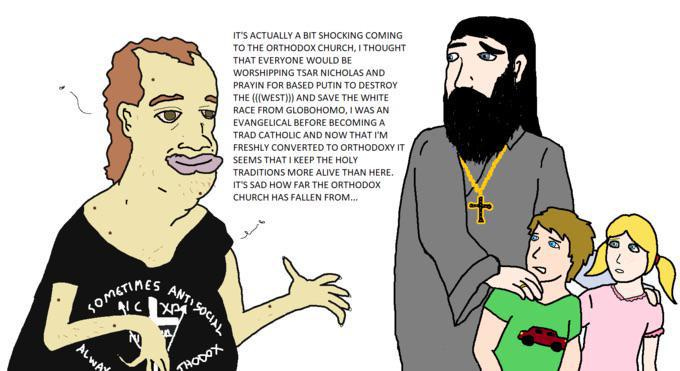
Christianity is Good for the West because it was an alignment towards an uncreated, transcendental Goodness that caused Europe to flourish spiritually. The civilizational benefits (better technology and knowledge, longer lifespans, less famine and drought, defeat of anti-Christian competitors, high culture and art) are just icing on the cake. Yes, Christianity is permanently woven into the DNA of the West, but nobody plays that as some sort of trump card that defeats rhetorical arguments claiming God doesn’t exist. And again, no true Medieval pagan would ever say something like 🤓 “oh, but I deduced this empirical evidence that the Christian God cannot exist based on the available…”. That is a very unpagan thing to do!
In fact, pagans of era didn’t see any problem with Christianity coexisting with their own indigenous beliefs. Different circles of pagans (such as the ones on iFungus) love to talk about how Christ was just added to their pantheon, and post pictures of the Cross necklaces with Mjolnir inside to depict how transactional their spirituality was. “Debating” a core part of their identity would make no sense to medieval Germanic pagans. You’re not going to “rationalize away” what makes their clan who they are, nor did early Christian missionaries try.
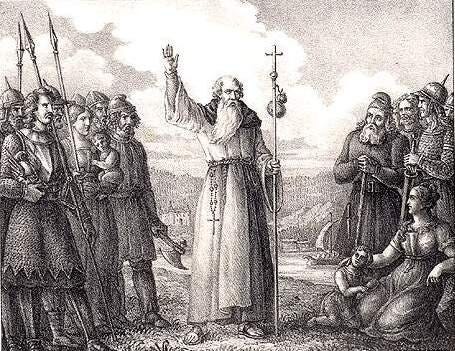
I bring this up because it calls into question if there has ever been a coherent definition of Germanic pagan spirituality. How can some of them want to split you in half with an axe for trying to empiricize a mystical spirituality, and the other half want to engage you on the historical evidence for Jesus?
You’re positing manmade tradition is the Summum Bonum by which all whites should live. Okay, where is it? Where is the “Authority” informing anything about this situation for pagans?
That is, the father is the paradigm of authority.
The truth is the basis of authority. And, lucky for us, the Truth is a person.
All the way back, what makes something authoritative is just that it made everything after it possible, including you.
“Something” is authoritative because it sets up future success? Does that mean the wheel, iron ploughs, and chain mail are sources of authority to pagans? No, but maybe ideas that serve this purpose are. So, how can we tell what ideas did this or not? When God tells His followers to “be fruitful and multiply”, is He contributing to “making everything possible, including [us]"? Again, when is this alleged authority going to swoop in and provide clarity?
Part of what makes European history so remarkable is its often a tale of peoples overcoming great odds against their survival, odds contributed to by man’s own hand. For example, the Wright brothers created a heavier than air glider despite the Greek philosopher’s false idea that objects of a different weight dropped from the same height would fall at different speeds in a vacuum (no air resistance). The Greek philosophers are still owed an enormous debt for the overall success of European peoples, but they didn’t just decree the truth for all time. They were famously wrong about many things, particularly in the hard (real) sciences— almost as if they lived in the Ancient world. However, on this “ancestral principle” worldview the pagan must blindly accept everything they taught because the Greek philosophers were indispensable to the survival of Europeans; and because they are older and therefore more truer than any other white people.
I get what IP is saying here with the filial piety, but this just isn’t true. Your ancestors are worthy of respect, but they aren’t some infallible pantheon of sages. They were imperfect mortals, and that’s what makes them special. They were defeated and did not quit, they overcame setbacks, they improved themselves, they invested in future generations, they struggled, they died.
I'll tell you a secret, something they don't teach you in your temple. The gods envy us, they envy us because we're mortal. Because any moment might be our last, everything is more beautiful, because we're doomed.
-Achilles, Troy (2004)
They were not spawned in as perfect omnipotent and omniscient human beings because they were (hopefully) white. Pagans often use this “ancestral principle” logic to turn their ancestors into demigods that decree the infallible truth from on high.
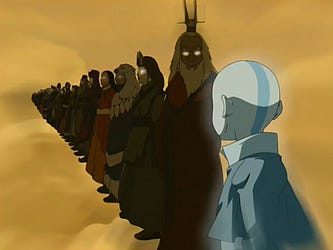
There are living ancestors of mine that I will absolutely not listen to. I’m sure, because they share blood with their own ancestors, there are people from the past that I share blood with that I’d absolutely nignore. This is part of why the Church venerates the living memory of our ancestors, but we don’t worship them even as some abstract cloud of genetic memory that can be connected with by lighting incense and concentrating on a framed photo of Himmler.

This is exactly what pagans believe, only more consistently. They say “if it disagreed with its own father, it was wrong, full stop.”
Which pagans, where, how?
This also isn’t even true historically, btw. There are loads of Germanic and other pagans who willfully disobeyed their own fathers and felt justified in doing so. Alexander the Great is a good example of this, when he spited Philip II. “ Rightly disobeying your father for your own glory” is even a celebrated motif of the Iliad, when Hector agrees to duel Achilles despite King Priam’s forbidding.
Again, “agree with what you think your ancestors believed no matter what” is a modern pagan reconstruction of what some people think the ancient Germanics believed— not what the historical record shows.
A consistent application of the ancestral principle—the very form of moral justification—leads one invariably to paganism
Is that a good thing?
because paganism built everything.
Lol
Society, law, custom, governance, technics, arts, ritual, myth, philosophy—everything
Does IP think Ancient Europeans were the first collectiive in human history to have art or “philosophy”? Nobody was ever smart enough to ask “why?” before the Scythians? This can only be conceivably true in the vague “eternal archetypes” sense, that I will address shortly.
Where were you when paganism laid the foundations of the world?
I wasn’t born yet, but the Christians of the time were following a much older religion!
Every axiom you hold, every intuition you have, every feeling in your gut—all these were given to you or bred into you by hundreds of thousands of years of paganism.
HUNDREDS OF THOUSANDS? Wtf. *Sigh…*

And anything that wasn’t given to you by paganism was justified
Didn’t we just read that paganism did give us everything lmao
on the basis of axioms, intuitions etc. that paganism begat.
Then how is Christianity a “foreign invasive religion” if it’s secretly pagan before it even existed because the Apostles lived in a world filled with pagan intuition and “created” the faith with pagan intuitions and assumptions? And didn’t it get paganized (again) by the Germanic warrior caste after the spread to Europe? How is that possible if it was already pagan because everything is pagan?
*tents hands*
No offense to IP, but I don’t find the Pagan “we wuz everythang” argument convincing at all. Even on its face, it’s super abstract— like “generational Holocaust trauma”, or “the tenth wave effects of slavery”.
Everything that came after, all the way up to modern liberalism, can only critique paganism on the basis of foundations that paganism laid.
I thought Christianity was a rapid departure from pre-existing pagan beliefs?
And this brings us to the ultimate point—that the source of authority cannot be other than tradition.
Early Church Father fans, we up.
You can’t ask why it’s good to obey (or disobey) the tradition without invoking norms, and tradition is the source of those norms
So is Christianity a foreign Canaanite thunder cult that should be removed from Europe, or is it secretly also pagan and therefore acceptable because it relies on pagan norms?
This contradiction never gets addressed.
One can object that the old gods are not real, and so the tradition is invalid. But that objection can only be made on the basis of assumptions, and those assumptions have come down from the tradition itself, which has its ultimate source in paganism.
Again, a properly pagan response is something like “I don’t care that you don’t believe in my gods, because they’re part of my identity through my family”. There was never a pagan scholar that traded rhetorical blows with Christian academics in learned letters, nor was there ever a “pagan missionary” to people outside their own ethnic groups. You don’t “become” a Germanic pagan anymore than a fish “becomes” able to breathe water. You’re born into it and grow up surrounded by it. The fact that this doesn’t happen anymore is alone a fatal critique of reconstruction attempts.
You guys are not supposed to tolerate the idea of a “first generation pagan”.
It’s impossible to argue against the tradition without invoking its authority.
Depends, but sure. Probably.
Perhaps we want to say “no, I got tradition from my parents, and that’s Christianity”. But then, your father got it from his father, and all the way back until someone abandoned his tradition.
Rather than reiterate what I said earlier about not knowing what the paganism of 300,000BC is, let me offer an interesting counterexample. Horses are an essential component of Indo-European spirituality, always have been. IE nobles were buried with them, they were depicted in art, ridden in battle, used for farming, sacrificed during rituals, etc. The horse was an inseparable icon of Germanic pagan spirituality.
Iceland, one of the last and strongest bastions of Germanic paganism in Europe, did not have a native horse population until probably the 9th century. Did Icelanders “forget their own tradition” because they probably didn’t land on the shores of Iceland with pregnant mares? What does that say about the permeability of their spirituality?
Only paganism can claim to derive authority out of something other than whim and caprice.
I don’t think the argument for this was successful at all. There are civilizations that had no contact with the IEs that established true spiritual authority just fine— unless Ancient China was actually fraudulent because they weren’t practicing authentic medieval Germanic paganism.
I thought you guys were every civilization ever too, doesn’t that mean everyone has access to this authority?
As it turns out, the accusation made against paganism that it’s just making things up, could not be more wrong
As we’ve seen, I think this argument has failed
The fact that we’ve been off-track for a long time hardly matters. Ancient error is still error
Except for when it benefits modern reconstruction efforts, and then it’s Tradition.
Closing: “We wuz everyone” and the fallacy of “Eternal Archetypes”
One of the most egregious errors of modern pagans is to attribute everything to their interpretation of paganism. This is one of the goofiest theories I’ve ever seen, up there with “the Mayans had iPhones”, and apparently the more serious academic pagans are trying to get rid of it. It doesn’t help that quotes like these do numbers in iPagan communities:

This image is hilarious for a few reasons
It assumes older = more gooder and truer
It assumes a binary between Christian and non-Christian societies and religions
It assumes all “pagan” religions are similar or even comparable (Is Zoroastrianism “pagan” because it's non-Christian? Why not?)
It assumes the Europeans of ages past would choose Paganism over Christianity if ever given the choice
It implies that there is a rigid “Pagan” worldview that has endured for literally tens of thousands of years
It assumes anything resembling Odin existed in that worldview the entire time.
Again, I don’t take myself or my Stacksona very seriously, but I am serious enough to say that this is shoddy scholarship. It starts with a conclusion and works backwards for a quick little rhetorical jab that is ultimately meaningless.
How do modern pagan scholars justify this position?
By introducing the nebulous “eternal archetype”.
Let me explain. These archetypes are motifs, aesthetics, characters, traditions, or other cultural imagery that are found across centuries and large geographical barriers. For example, some version of a “Sky king” is present in basically every culture group you can think of. Well, at least the white ones. The numerous African equivalents don’t count because.. erm.. they JUST DON’T OKAY??
Therefore, there must be some undercurrent that bonds the intuition of everyone descended from Indo-European peoples. How else could a druid in Celtic Britannia, an oracle from ancient Athens, and whatever is going on in India all reach the same conclusion?
Therefore, there is something like an electrical current pulsing through the veins of the purer Aryan peoples today that allows them to make an unspoken connection through their blood memory:
I wander not in darkness
I am not lost, nor bewildered
The path is not hidden
The tracks are not old
I was here a moment ago
I am home
-Burzum, Forgotten Realms
Building this idea out across the gorrillions of centuries everyone on earth was a pagan Aryan reveals “eternal archetypes”: inventing and reinventing the same idea in a cycle of remembrance and forgetting.
How convenient! Now, the recent extinction of paganism is merely part of a larger cycle. Like a boomerang returning to the hand of Wodan, today’s reconstructionists can rest assured that the Europeans of 500,000AD will believe exactly what they do!
Or, it’ll be something vaguely similar with irreconcilable differences. Conveniently, it still counts either way because the “eternal archetype” still applies. If you couldn’t tell already, this is a very coy “Heads and I win but Tails and you lose” set up. Pagans can stand around and wait for something they find acceptable to emerge from the annals of history or the future, and then proudly proclaim that it was actually “deeply pagan” all along.
Some have even extended this into a monopoly on anything they think is cool. Have an inclination to compete against other men? That’s actually a deeply pagan instinct because athletics and sports are “pagan”. Want to spend time outside? Actually the result of morbillions of years of genetic conditioning watchfully overseen by pagans. Christians accomplish something noteworthy? Secretly pagan btw. Text from the Bible makes a good point? It was the conditioning of a secret pagan sect that guided the writer’s hand. All it takes is a selected text from a definitely objective book to affirm that actually, every accomplishment ever was achieved under the guiding wing of the pagans of quintillions of eons past.
This might sound nice at first, but it falls apart under heavier scrutiny. Here are some major flaws with this zany theory.
It only takes credit for the good: What is “good” is the subject of debate amongst pagan thinkers today. Sometimes, the survival of the white race is the penultimate issue that only pagans can solve. Other times, war is the white man’s sport and we should actually all be steppe cattle rustlers who kill other whites for fun.
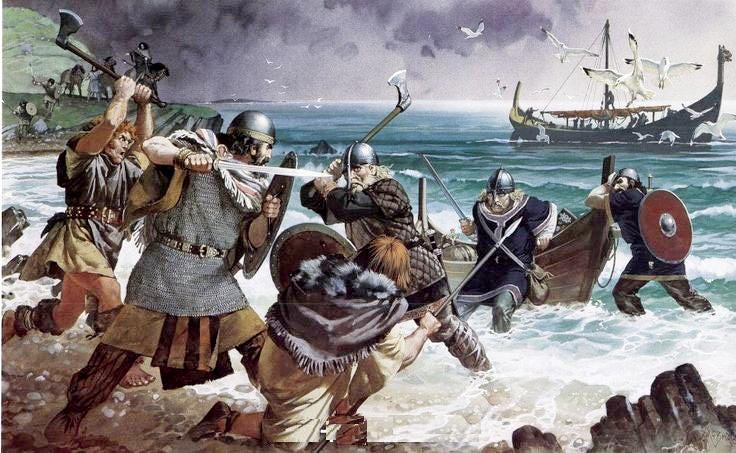
Either way, you’ll never see a Pagan say that the (nominally) Anglo leadership of England’s innate desire to pack the island with brown people is actually deeply pagan. Despite… Pagans themselves serving as the “parasitic Aristocratic class” throughout history. Remember, the ancient Pagan scholars said in one clear voice that the ethics of one’s actions depends on their skin color. Indian men groping white women on the Chewb? TJD! But White men raping their volk while on Vikingr? Actually based and non-Jewish mindrot pilled. Is my “innate instinctual feeling” to go blow the toilet up after I press publish pagan? Is my desire to be faithful to my spouse pagan? Who decides, how, and why?
Oh, it’s actually open to individual interpretation according to “instinct” with no input from the tribe, its elders, or tradition? How un-Pagan!
It is unspecific to a fault: There is no way to determine what is a “deeply pagan instinct” and what isn’t. One solution to this you’ll sometimes see is that “everything natural is pagan and everything metrosexual is Christian”, complete with mention of the Roman slave writhing biomass that inflicted the plague of Christianity upon the
poordeeply pagan Roman nobility and the later enlightened forest folk of Gaul. What we know from the records of how early medieval Germanics actually operated paints a very different picture from this interpretation. Remember, most people today unconsciously assume Germanic pagans shared most of today’s morality. After all, both Christians and Pagans despise homosexuality! However, this is far from the truth. One quick example comes from the way that Pagans often took power from one another: intrigue, betrayal, and assassinations. “Outwitting your opponent” was considered fair game for most Medieval pagans (and their descendants, including the famously treacherous Normans). I mean, even someone like Arminius is revered for effectively abusing Roman welfare gibs for years before betraying them in the Teutoburg Forest slaughter.
And yes, before your thumbs go flying, their Christian inheritors also practiced these sinful deeds at smaller scale.
Saxo Grammaticus documents some ways the Danish crown passed through betrayal and cunning, particularly amongst family. So, is being loyal to a friend or brother a pagan instinct?
This same culture produced the Havamal, a work I particularly like, which implores its Scandinavian audience to be faithful friends:
Friends should provide their friends with weapons and clothing; this kind of generosity shows. Generous mutual giving is the key to lifelong friendship.
So, which one of these cultural instincts is the Jewish deception and which one was pagan for billenia?
More from Havamal:
Kind, brave people live best, they never nurture a grudge. But an unwise man worries about everything; he dreads even repaying a gift.
Should the author be bogged for this un-warrior slave mentality?
Seriously, is monogamy Jewish? Is rape actually based and Aryan? The same Big Saxo document I linked earlier describes what is probably Odin raping Rindr. Is this a precept that the Vikings followed? Is rape actually Odinnic and Aryan? Or were the Vikings Jewish for abusing white women? Again, nobody knows!
It’s almost as if the ethics, morays, and traditions of the Germanics were in constant flux depending on external circumstances.
It assumes an omnipresent cosmology in which order is the goal: Often, the “eternal archetypes” are styled as a truth that has “always existed” that the awakened Aryan has now merely oriented to. The problem is that order was never the goal (think Ragnarok) and the gods of the Germanic and Greek pantheons do not function like the Christian God. They don’t have to even act like their gaining power will benefit their devotees or somehow reveal truth— ironic given that their power seems to stem from worship by mortals. In other words, there was never a concept that their presence and power was omnipresent— this is a later Christian ideal. Previously, the gods mostly had to be sought after in holy places: groves, burial grounds, etc.
It ignores historical counterexamples
The idea is that all Indo-European spiritualities have overlap in key areas because of an innate pull towards something inside us. What about the non IE peoples who reach the same conclusion? What about the African tribes that also had tribal feuding, raiding, deep connection to nature, and lived in huts on the perimeter of a greater civilization?
A man who prides himself on his ancestry is like a potato plant, the best part is underground.
-Ancient Swaziland Proverb
Wow, how based! All those guys need to do is board a longship on his hasterluder wandervogel quest to another land to rape and pillage conquer for their people and they should fit right in with Germanic pagan reconstructionists today.
Conclusion
I don’t find the arguments presented in this article very compelling. However, I do see a struggle towards higher ideals in Germanic pagan reconstruction efforts today.
From The Orthodox Way:
While present everywhere in the world, God is not to be identified with the world. As Christians we affirm not pantheism but “panentheism.” God is in all things yet also beyond and above all things. He is both “greater than the great” and “smaller than the small.” In the words of St Gregory Palamas, “He is everywhere and nowhere, he is everything and nothing.”
As a Cistercian monk of New Clairvaux has put it, “God is at the core. God is other than the core. God is within the core, and all through the core, and beyond the core, closer to the core than the core.”
There came to St Antony in the desert one of the wise men of that time and said: “Father, how can you endure to live here, deprived as you are of all consolation from books?” Antony answered: “My book, philosopher, is the nature of created things, and whenever I wish I can read in it the works of God.”
Evagrius of Pontus




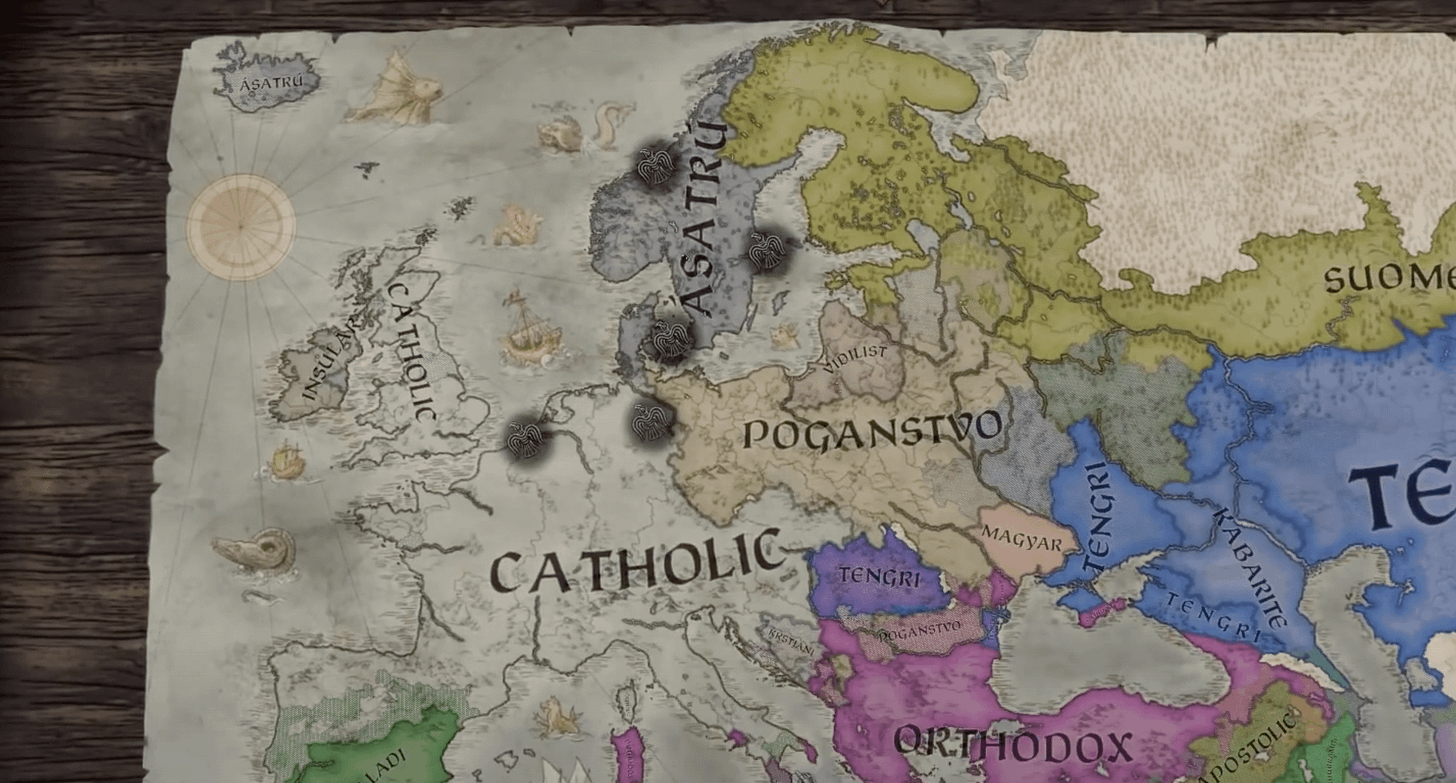
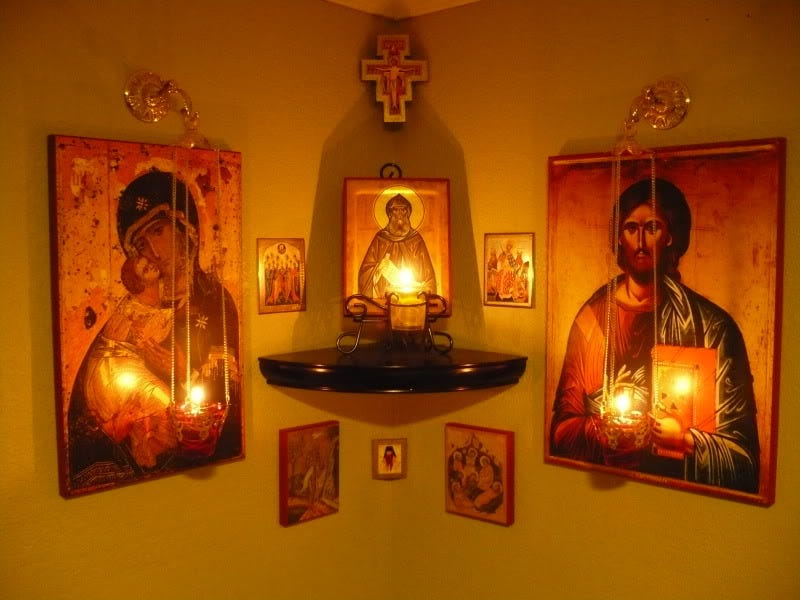
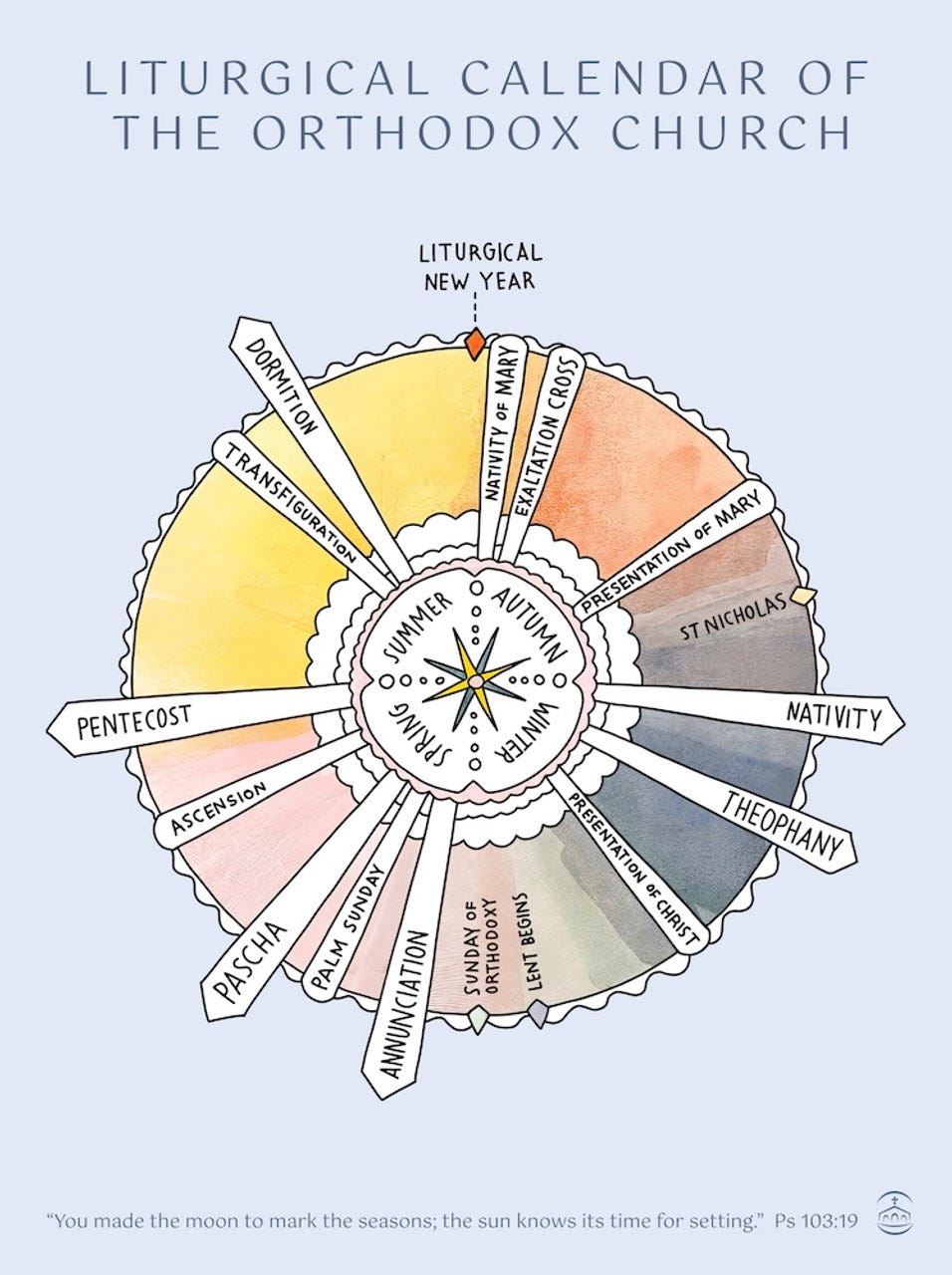

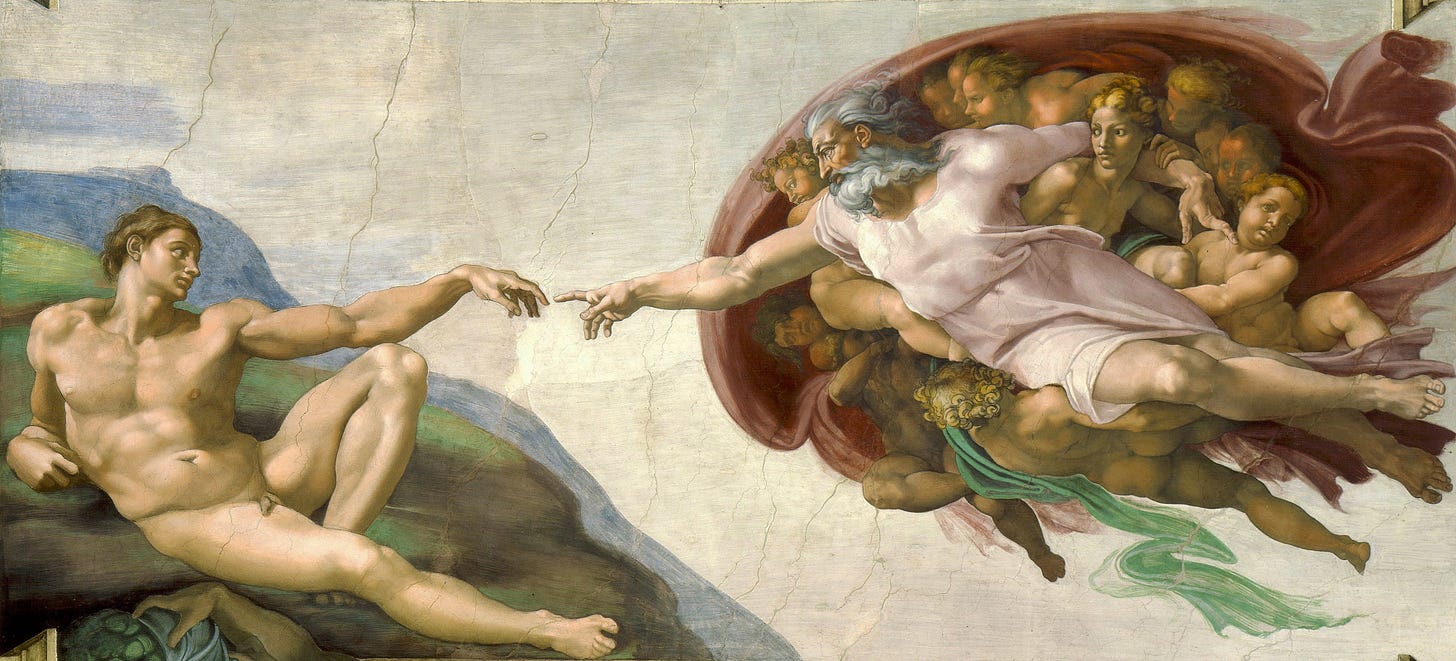
![Dominion: How the Christian Revolution Remade the World [Book] Dominion: How the Christian Revolution Remade the World [Book]](https://substackcdn.com/image/fetch/$s_!oYf8!,w_1456,c_limit,f_auto,q_auto:good,fl_progressive:steep/https%3A%2F%2Fsubstack-post-media.s3.amazonaws.com%2Fpublic%2Fimages%2F810b9570-c3d3-4966-921b-e70658df9175_1651x2560.jpeg)
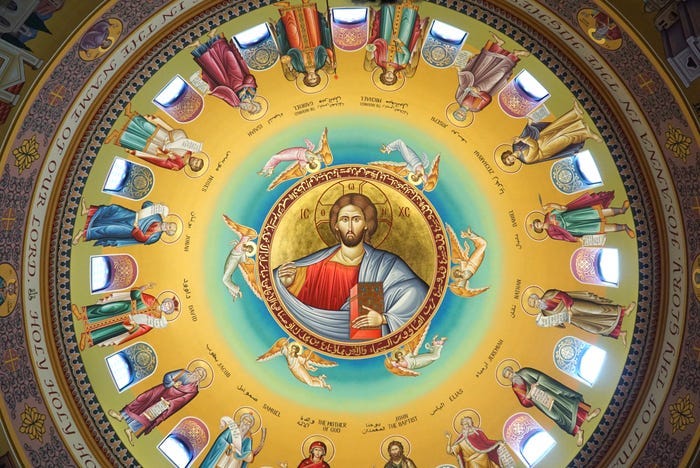
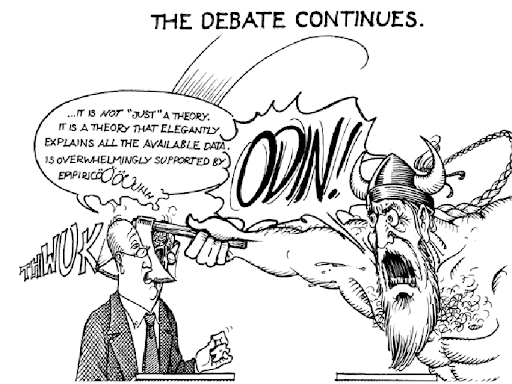

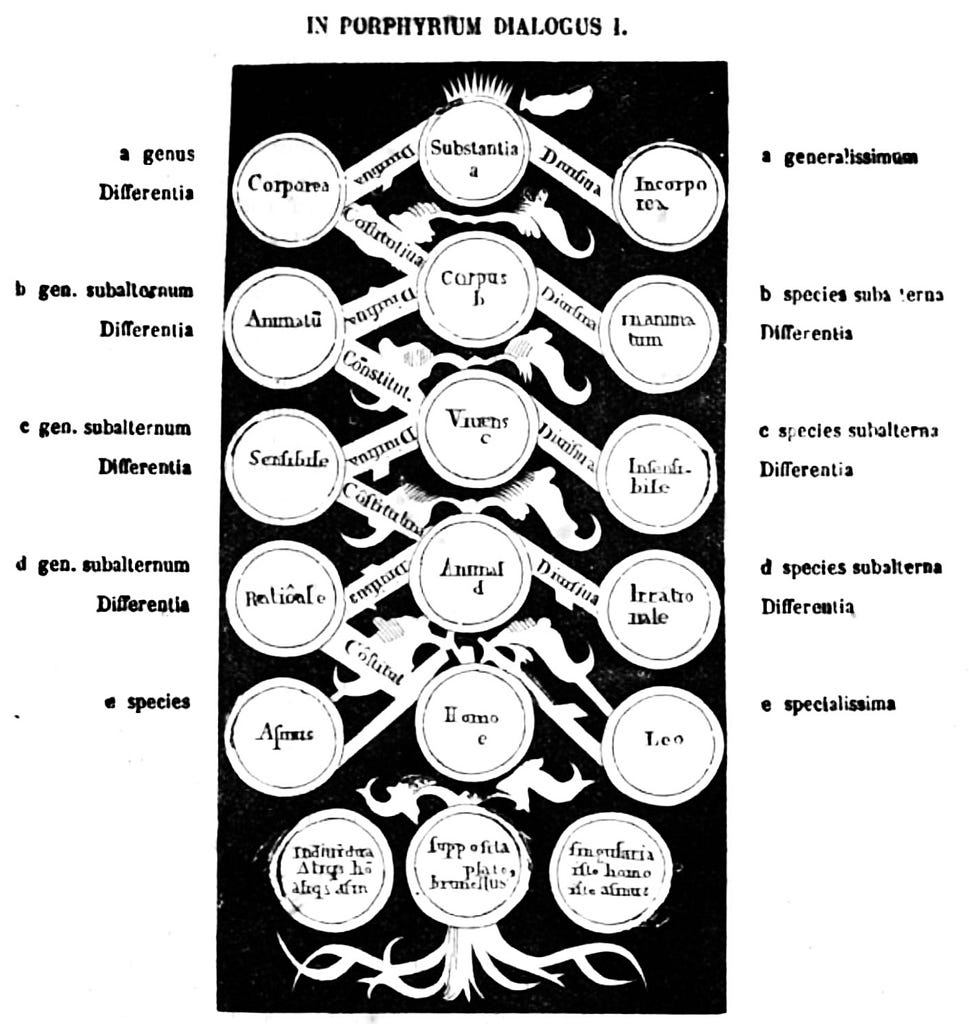
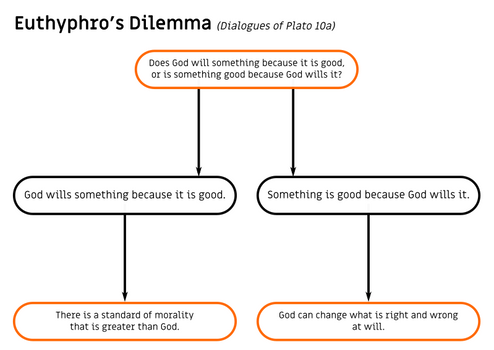
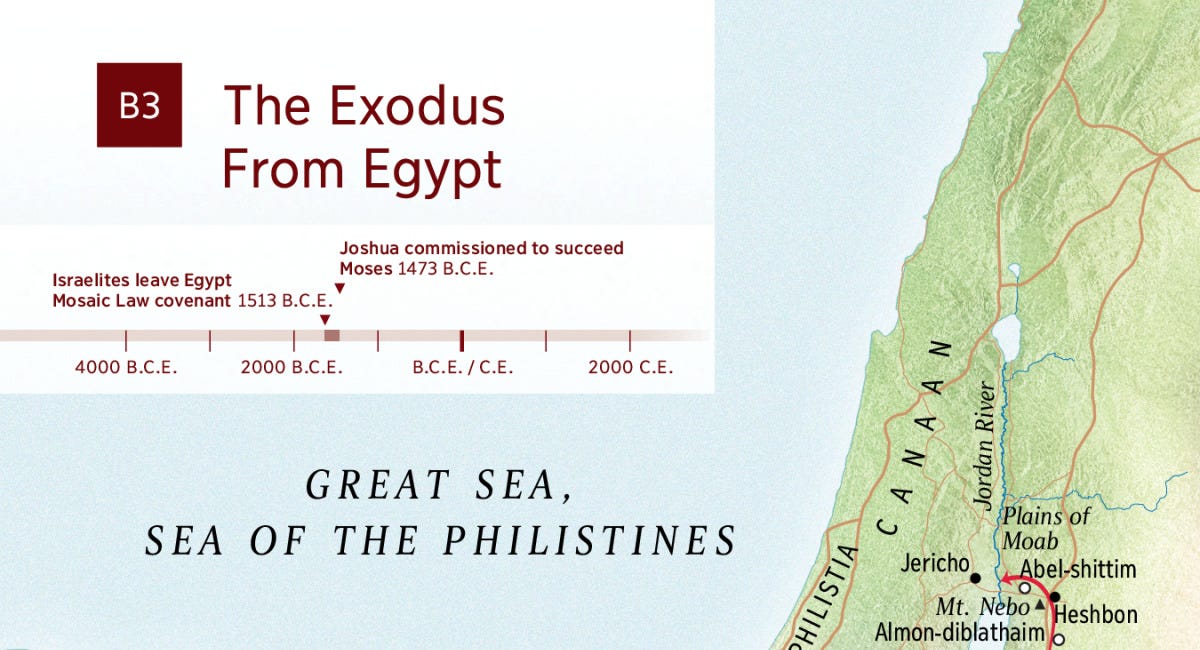




@Aodhan MacMhaolain
Thoughts
You fundamentally misunderstand paganism. Paganism is not a religion in the same way that Christianity is a religion. Under the hood, in the workings of both the individual and collective unconscious, it is something else entirely. It is not a belief system so much as it is an observation system. Paganism observes the world as it is and adapts to changing conditions. It is situational awareness within a living and intelligent universe. It does not attempt to impose a static and unchanging state on a dead, material universe. It certainly does not look forward to an eternal global tyranny headquartered in Jerusalem.
Paganism is primordial. It is the world-feeling that co-evolves with the genetics of a population group within a specific ecosystem. There are as many types of paganism as there are population groups.
A population group that evolves in a forest/mountain environment has a higher probability of becoming genetically predisposed to a polytheist and animist world-feeling, due to the abundance of life to which it is exposed over thousands or tens of thousands of years. A population group that evolves in a desert environment has a higher probability of becoming genetically predisposed to to a monotheist world-feeling, due to the relentless, overbearing, inescapable, and deadly presence of the sun.
As far as the archaeological record tells us to date, paganism, and more specifically animism, is the default world-feeling of all human and human-adjacent species. Revealed religions are anomalous in the history of human and human-adjacent species. They do not “take” without extreme violence and trauma, because they do not fit the genetic predispositions of most people groups.
The genetic predisposition to a particular world-feeling can be expelled from neither a population group nor from an individual. The best monotheism can do is break the human spirit, such that performance of the monotheism becomes automatic for the purpose of avoiding pain and death; and in the case of Christianity, avoiding eternal torture. It can never become the true nature of a population group in which it did not evolve. It is only ever a mask, a superego injunction so vicious it created and maintains the split between conscious (“good”) and subconscious (“evil”).
Those of us who pursue our ancestral world-feeling do so for the purpose of getting beneath the monotheist mask. Our goal is to recover and/or innovate ways of being in the world that permit authentic understanding and expression of our identity, including and especially our inherited, innate predispositions. Christianity forbids authentic understanding and expression of identity. Its goal is to crush "sinful" human nature out of existence and replace it with itself.
Paganism is what’s left after detoxing from the Christian imposition. It’s who we are underneath centuries of performing a false, externally-imposed identity. If we are not blank slates for communism, then we also were not blank slates for Christianity.